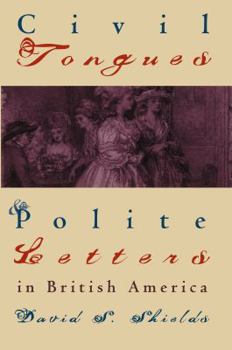Civil Tongues and Polite Letters in British America
Select Format
Select Condition 
Book Overview
In cities from Boston to Charleston, elite men and women of eighteenth-century British America came together in private venues to script a polite culture. By examining their various... This description may be from another edition of this product.
Format:Paperback
Language:English
ISBN:0807846562
ISBN13:9780807846568
Release Date:May 1997
Publisher:Omohundro Institute and Unc Press
Length:382 Pages
Weight:1.35 lbs.
Dimensions:1.0" x 6.2" x 9.3"
Customer Reviews
1 rating
On the creation of "civility"
Published by Thriftbooks.com User , 22 years ago
David Shields' Civil Tongues and Polite Letters traces the development of the concept of civility as evidenced by the formation of social rites and their corresponding literatures in British America. Shields argues that just as Americans developed their political and legal traditions to accord with traditional British values, they also defined their concept of civility and genteel culture from metropolitan European ideals of fashionability. He explains that these socially acceptable forms of public discourse originated in the taverns and coffeehouses of 17th century England as the bourgeoisie and minor aristocracy came to replace the courts of nobility in dictating desirable behavior. The valuation placed upon politeness, gentility, and especially wit remained hallmarks of upper and middle class society throughout the development of colonial culture in the 18th century, and served to unite colonists in an otherwise still developing society while it provided a means by which to discuss their differences as well. Using the letters, poetry, and published essays of the new gentility, Shields begins his study in the male dominated taverns and coffeehouses of early 17th century England, where merchants, professionals, and landowners congregated to discuss business and engage in pleasurable diversions. By mid-century, these social gatherings had expanded to include upper class women as their locales shifted to include more fashionable spas. The pretentiousness, licentiousness, and irreligious nature of spa culture came under attack by conservative observers in the 1690s, but even critics of the bourgeoisie employed the same literary techniques to express their disapproval. Similar literary cultural sparring was carried on between Quakers and socialites in Pennsylvania, "sensible" women and misogynistic critics of feminine culture, college students, and political rivals in the colonies. Indeed, perfection of literary graces became the ticket to social inclusion throughout the metropolitan cities of the New World, and even as society divided into clubs and associations of specialized interests, the upper classes were all marked by the same concepts of civility. As a professor of English, Shields' work is heavily marked by literary interpretation unusual to more standardized histories, which may prove frustrating to some historians. Nonetheless, he has clearly shown that the culture of politeness was critical as an American institution, especially in the early years of the Republic when Americans were still debating which other standards would become hallmarks of nationality. Especially enlightening is his treatment of female essayists and social arbiters. In most studies of upper class American culture, women as independent and original thinkers have been treated as practically nonexistent, and it has often been asserted that we cannot divine their motivations and aspirations because they seldom left written commentaries. Shields has proven th





